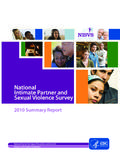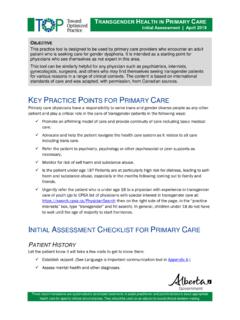Transcription of TAKING ROUTINE HISTORIES OF SEXUAL HEALTH: A …
1 TAKING ROUTINE HISTORIES OF SEXUAL health : A System-Wide Approach for health CentersNew Edition: November 2015 NATIONAL LGBT health EDUCATION CENTERA PROGRAM OF THE FENWAY INSTITUTE1340 Boylston Street | Boston, MA 02215 | Wisconsin Ave, Suite 1100W | Bethesda, MD 20814 | | 1 TAKING ROUTINE HISTORIES OF SEXUAL health : A System-Wide Approach for health CentersNovember 2015 IntroductionLearning about the SEXUAL health and behavior of patients is an important part of providing high-quality, patient-centered, accessible, and efficient health care to the people in your health center. This toolkit has been created to help develop and implement systems for collecting ROUTINE HISTORIES of SEXUAL health with all adult patients. SEXUAL HISTORIES should also be taken with adolescent patients. However, because the history- TAKING approach differs somewhat for adolescents, we recommend supplementing the information provided here with additional resources focused on adolescents.
2 Understanding that all health centers are different, the tools have been designed to be adaptable to different practices and patient populations. Additionally, an extensive list of resources has been included to further your learning about SEXUAL health and behavior and TAKING ROUTINE SEXUAL toolkit is divided into three sections: The ROUTINE SEXUAL History Tool 2 Special Populations and Considerations 16 Getting it Done: Recommendations and Tools for Implementing ROUTINE SEXUAL HISTORIES in your health Center 22 2 | TAKING ROUTINE HISTORIES oF SEXUAL HEALtHSection I. The ROUTINE SEXUAL History ToolWe can learn about our patients SEXUAL health and behavior by TAKING a ROUTINE SEXUAL history. SEXUAL history information should be taken from all adolescent and adult patients, regardless of gender, race, ethnicity, socioeconomic status, SEXUAL orientation, and gender identity. IN THIS SECTION: The ROUTINE SEXUAL History: What, Why, and How?
3 3 Asking SEXUAL History Questions: How to Begin 5 SEXUAL Risk Assessment 8 Counseling and Education 12 SEXUAL health , Function, and Identity Questions 14 Resources for Further Learning 15 IntroductIon | 3 The ROUTINE SEXUAL History: What, Why, and How?WHAT IS A ROUTINE SEXUAL HISTORY?The ROUTINE SEXUAL history is an essential part of a patient s comprehensive history during an annual prevention visit. In busy health care practices, it is not uncommon for providers to skip the SEXUAL history unless a patient has signs or symptoms of sexually transmitted diseases (STDs).
4 Providers may also avoid TAKING SEXUAL HISTORIES because they do not feel comfortable asking sensitive and potentially embarrassing questions. However, the SEXUAL history can be done in a timely and straightforward manner when health centers take a few initial steps to set up systems that support providers, and other members of the clinical care team, in TAKING HISTORIES . WHY IS THE ROUTINE SEXUAL HISTORY IMPORTANT FOR PATIENT health ?When we ask about our patient s SEXUAL partners and practices, we are practicing patient-centered care. Studies show that our patients want us to ask about SEXUAL issues. In a survey of 500 men and women over age 25, 85% of respondents expressed an interest in talking to their providers about SEXUAL concerns, even though 71% thought their provider would likely dismiss their Moreover, a SEXUAL history followed by appropriate, targeted discussion about ways to stay healthy can enhance the patient-provider SEXUAL history not only gives opportunities to educate and counsel patients about HIV, STDs, and viral hepatitis, but also allows providers, or other members of the clinical care team, to connect patients to treatment and care.
5 Without TAKING a SEXUAL history, it is difficult to know what tests or vaccinations are needed. These mostly silent diseases can go unnoticed for long periods of time until they lead to more serious illness. Without treatment, they can also spread to other partners and increase disease in the community. There are new federal government programs and initiatives that have the goal of greatly reducing HIV, STDs, and viral hepatitis in the health care system. Community health centers and other health care practices that care for underserved and vulnerable populations are essential to reaching these goals because their patients are often most at risk. 1 Marwick C. Survey says patients expect little physician help on sex. JAMA. 1999;281 I: THE ROUTINE SEXUAL HISTORY TOOL | 3 4 | TAKING ROUTINE HISTORIES oF SEXUAL HEALtHHOW IS THE SEXUAL HISTORY TAKEN?Ideally, a patient s SEXUAL history should be taken at their initial visit to the health center, and at annual prevention visits.
6 There are two methods for TAKING the SEXUAL history:1. By the provider, or other member of the clinical care team, during the visit2. Filled out by the patient in a paper or electronic form in advance of the visit, and then reviewed with the provider, or other member of the clinical care team, during the visitYour team can decide what works best for your practice. Paper and electronic forms can provide more information in a shorter amount of time, and can save a lot of time during the visit. Because the questions are standard across all patients, this makes it easier for entering information into electronic health records, ensures that these questions are asked, and helps your team measure and track population health . Templates for SEXUAL HISTORIES can often be built into electronic medical records (see the sample at the end of this tool kit). If using paper or electronic forms, you should consider the following: Will paper forms be sent to patients homes and/or filled out in the waiting rooms?
7 Do the waiting rooms offer enough privacy when filling out forms? Might patients feel uncomfortable handing forms to receptionists or medical assistants, some of whom they might know from the community? How can you train staff to handle the forms? How will you ensure protection of data in electronic forms? Is the health literacy level of the questions and instructions appropriate for your population?SEctIon I: tHE ROUTINE SEXUAL HIS tory tooL | 5 Asking SEXUAL History Questions: How to BeginFor a customizable Word version of this section, visit or 1. SET THE STAGE: The SEXUAL history can come up naturally when talking with a patient as part of the social history. It can also be asked in relation to their past medical history or history of reproductive health . Before starting, you can let the patient know that you ask SEXUAL history questions of all patients every year as part of their ROUTINE care. You can use a statement such as: I am going to ask you a few questions about your SEXUAL history.
8 I ask these questions at least once a year of all my patients because they are very important for your overall health . Everything you tell me is confidential. Do you have any questions before we start? If patients want to know why you need to ask these questions, and why they are important to their health , you can use statements such as: Your SEXUAL health is important for your overall emotional and physical health . We ask these questions every year because it is common for people s SEXUAL behaviors and partners to change over time. As you may know, SEXUAL activity without protection can lead to sexually transmitted diseases. These kinds of diseases are very common and often there is no way for you to tell you have them. If we don t catch and treat these diseases, you can become very sick. These questions can also help guide a conversation about ways to protect yourself from sexually transmitted diseases, unwanted pregnancy, or other things that may concern you.
9 It will also give you an opportunity to talk about problems with, or changes in, SEXUAL desire and functioning. If the patient declines to complete a SEXUAL history with you, ask if there is another member of the clinical care team with whom they might be more comfortable. If they have already provided this information to someone else ( , social worker), see if they will sign a release to allow primary care to obtain that information. Be straightforward, but sensitive and open to different behaviors (See Effective Communication Strategies When TAKING a SEXUAL History in Section III for more recommendations on ways to do this). 6 | TAKING ROUTINE HISTORIES oF SEXUAL HEALtH2. ASK THREE SCREENING QUESTIONS: Have you been sexually active in the past year? Do you have sex with men, women, or both? (If both, ask the next question twice once for male partners, and once for female partners.) How many people have you had sex with in the past year?
10 3. DETERMINE IF THE PATIENT NEEDS A MORE DETAILED RISK ASSESSMENT: In general, patients with multiple sex partners, and male patients who have sex with men, should be asked additional questions to assess their risk for HIV and STDs. If a patient reports only one partner, ask if this is a casual or long-term partner, and if the patient knows if their partner is having sex with other people. Questions about the use of protection, history of STDs, and other risk factors may still be needed for these patients. If a patient has not been sexually active in the past year, but this is the first time you have taken their SEXUAL history, ask if they ve ever been sexually active, the gender of their past partners, and how many partners they have had. Again, you may wish to do further screening questions about protection, relationship to partners, etc. All patients, regardless of SEXUAL history, should also be asked whether or not they have any concerns about keeping themselves sexually safe and healthy.
















![Ghana Demographic and Health Survey 2014 [FR307]](/cache/preview/7/e/0/d/a/7/a/d/thumb-7e0da7ad1df07f972eeac2864b57fe34.jpg)

